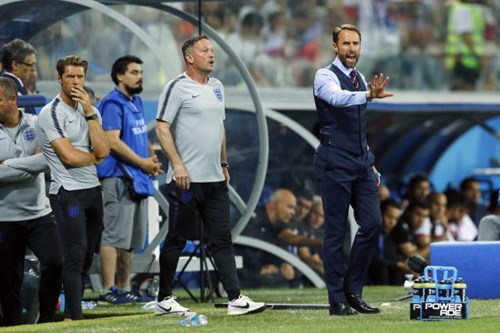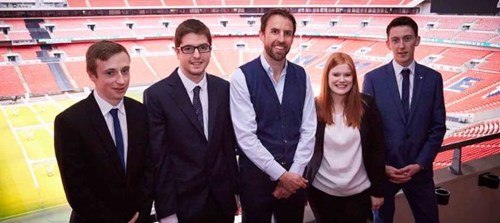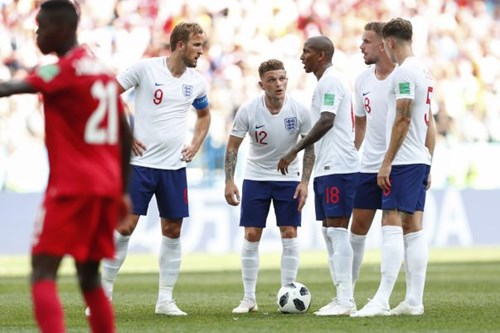With qualification for next year’s World Cup in Russia confirmed, Gareth Southgate can be quietly pleased with his time so far as England manager. Future Sport met with the Three Lions boss at Wembley Stadium to discuss the unique challenges, rewards and opportunities a career in the sports industry offers, and to further understand the man charged with leading a nation desperate for success on the international stage…
This interview originally appeared in UCFB’s Future Sport magazine, which can be read in full here.
An England manager will collate as many column inches throughout a year as the Queen or Prime Minister. Much like them he will have his critics, people watching his every move and his every utterance repeated in newspapers around the world.
But what he has to bear that Her Majesty and the key holder to Number 10 doesn’t is the never ending expectation and hope of a success starved nation. He is a flag bearer for the country that gave birth to the beautiful game, and one that is desperate for international relevance once again.
Next year’s World Cup in Russia will mark 52 years since that famous summer of 1966, and Gareth Southgate knows he’ll be reminded of that every single day over the coming months. The 2010 and 2014 World Cups saw the Three Lions exit in the last 16 and group stages respectively, and last year’s Euro 2016 exit and loss to Iceland remains one of English footballs darkest hours.
“You must learn from those experiences and analyse what went well, what went wrong, and what you might have done better,” he says. “You’ve got to be honest with yourself in appraising your performance.”
Previous tournament failures weren’t Southgate’s fault, but his words won’t have fallen on deaf ears. With Roy Hodgson handing in his notice straight after the Iceland game, the search was on for the next saviour of English football. Sam Allardyce came and went within 67 days. Enter Southgate. Reluctant to take the job after Hodgson, Southgate was now the only man for the role.
Mixed success as boss of Middlesbrough and England’s under 21’s might not suggest England manager potential, but it’s Southgate’s obsession with learning new methods and adapting new practices that had The FA mark him out as a man to watch even before his playing career had finished.
“Part of coaching is having a thirst for knowledge and improving,” he says. “You need to be always looking for new ways of working and new methods of getting the players to understand your messages.”
He adds: “The basics of a good work ethic are at the heart of anything. You need to be willing to learn and improve all the time. You always must be thinking how to get a result tomorrow but with an eye to six months or a year down the line.”

Southgate on the sideline during the 2-1 group win over Tunisia.
He lists research papers, YouTube and refresher courses as perfect examples. “There are so many opportunities with the internet to learn and improve in different areas, so there’s no excuse.”
He adds: “You’re constantly looking for an edge that might help you improve as a team.”
The word “edge” appears numerous times during Southgate’s talk with us. Since losing to West Germany on penalties in the 1990 World Cup semi-final, England haven’t beaten an elite world nation over 90 minutes in a knockout game of tournament football. Edge is clearly something he’s working on at St George’s Park.
To help find it, Southgate spent time with Eddie Jones and his England rugby team ahead of the 2017 Six Nations. During his 18 months in the job, Jones has transformed England into the team most likely to unseat New Zealand as the world’s number one nation, so Southgate’s methodology deserves some faith.
“To compare different sports is interesting because they’ll have similar problems that they approach in a different way,” Southgate says. “Eddie runs a national team so there are similarities in some of the bigger issues we face as a national coach. You don’t have the players as often, and there are areas around national set-ups that are unique – the time you have the players, the challenge of the opposition, the media interest and the challenge of building a culture in a short period of time.”
He added: “It was great for Eddie to look at what we did, make observations and challenge things as a different coach. We then did the same when we travelled and watched them work and see what might work for us and help us improve.”

Gareth Southgate with students at UCFB Wembley.
Southgate’s path to his current role began in 2010 when The FA appointed him as their head of elite development. The institution’s multi-million-pound investment in St George’s Park was heralded, but it needed a man to make it tick when it opened in 2012. So Southgate, alongside Sir Trevor Brooking, went about remodelling the youth game and strengthening clubs’ ties around the country.
The incredible World Cup win for England’s under 20s in June 2017, and the under 19s European Championship win a month later, are the first signs that St George’s is now starting to pay off. Southgate’s early work for The FA centred around creating an improved pathway for coaches in the game and transforming the early years of a young player’s career with smaller pitches and goals.
His work with younger players hasn’t stopped now he’s in the hot seat. “We try to keep in regular contact with the youth groups and go into their clubs to see them just so they know we’re watching and what’s going on in their life.” The message is clear to younger players – train, improve, work hard and your chance will come with the senior side.
With a steadfast belief in education and constant improvement, the former Crystal Palace, Aston Villa, Middlesbrough and England defender was keen to see UCFB during his visit, speak to its students and learn more about the institution’s commitment to training the next generation of sport professionals.

Captain Harry Kane and team mates versus Panama.
Southgate was clearly excited with the idea of a place where media, business and event specialists are upskilled – not just coaches.
“It’s really exciting that there’s a centre of excellence for people who want to go and work in our industry and across other sports,” he said. “There are any number of options open to people if they love sport and want to be involved in it if their skill set isn’t in coaching or their mind set isn’t being involved with the media, for example.”
He added: “There are so many areas that go into running a stadium like Wembley, or that go into running a successful club. Clubs now want experts in all of those fields with education that could be more specific to those areas.”
Southgate doesn’t speak in clichés. He’s articulate, measured and not afraid to make big calls – just ask Wayne Rooney. In 2010 Fabio Capello scared his players so much they were frightened to express themselves. In 2014 and 2016, Hodgson sent his players on to the pitch without a plan. In 2018, barring a monumental disaster, England fans at least know they’ve a manager who will allow his team to play.
Winning it would be a stretch but a semi-final would be good, wouldn’t it?
















